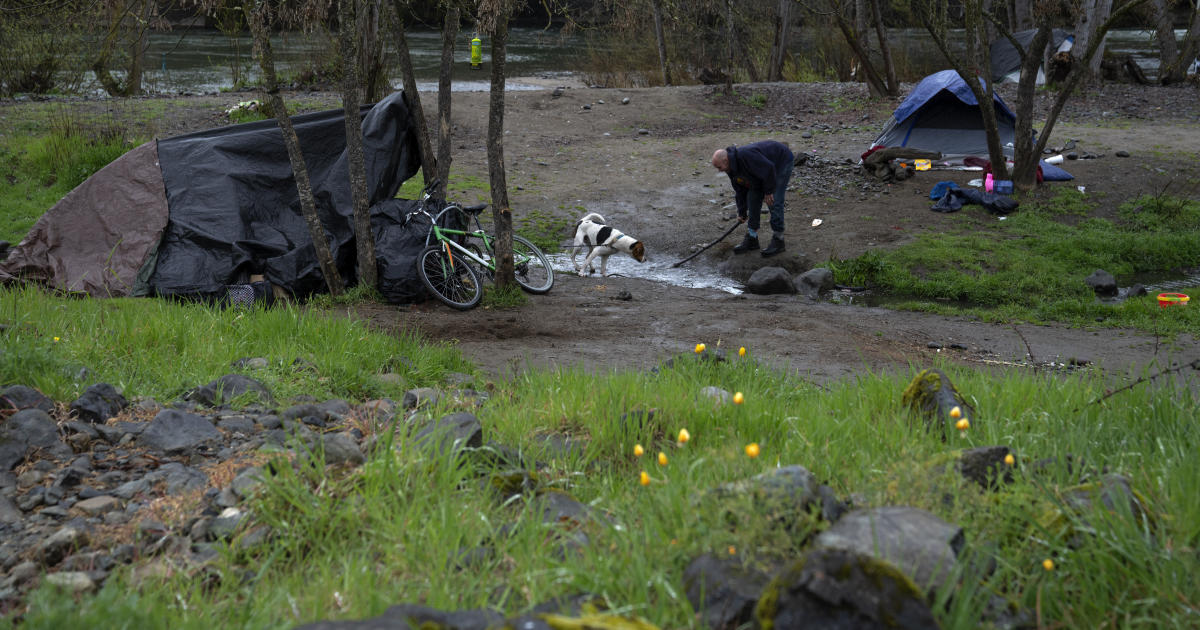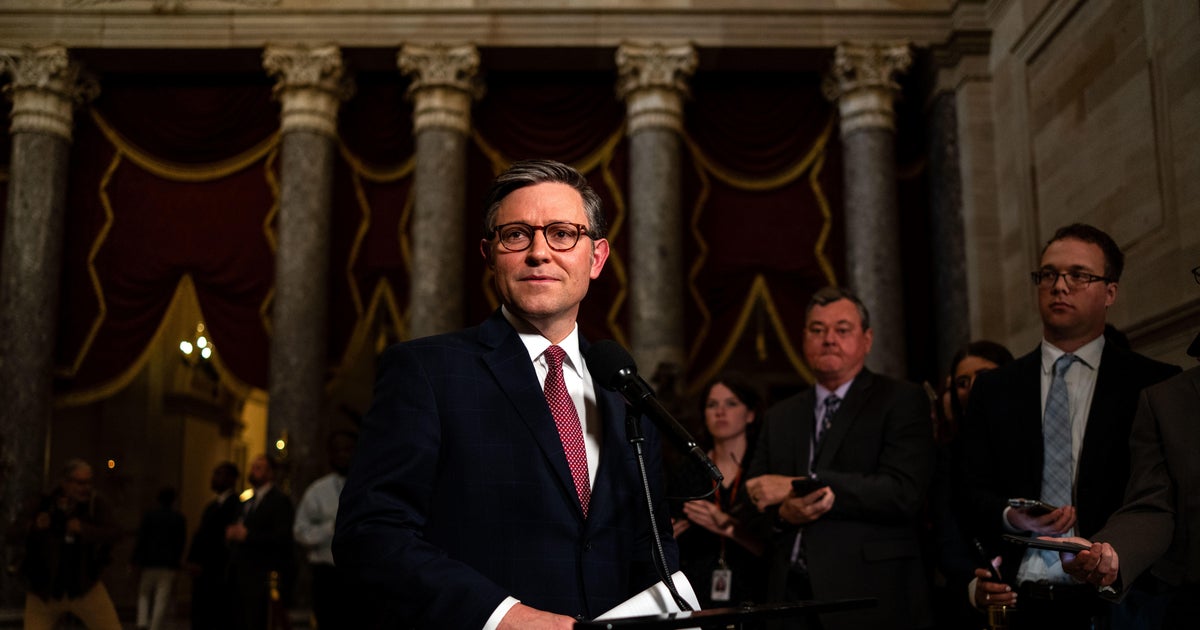Transcript: Moncef Slaoui on "Face the Nation," January 3, 2021
The following is a transcript of an interview with Operation Warp Speed Chief Adviser Moncef Slaoui that aired Sunday, January 3, 2021, on "Face the Nation."
MARGARET BRENNAN: We want to go now to the chief adviser for the US vaccine effort, that's Operation Warp Speed. Dr. Moncef Slaoui joins us from Miami. Good morning to you, Dr..
DOCTOR MONCEF SLAOUI: Good morning, MARGARET.
MARGARET BRENNAN: Have U.S. officials given any insight into how this more contagious version of the virus that's detected in the U.K. and South Africa, what the impact is? We know it's, from the U.K. at least- that version, is in at least three US states.
DR. SLAOUI: Yes, so that's the information we have. The virus- this virus actually mutates as part of its normal behavior and therefore it is normal to expect that there will be variants. What's very important is to study those variants and understand how infectious they are, whether they have more impact in terms of morbidity or mortality, and critically now, whether they are still sensitive to the vaccines that have been developed. And on those three counts, based on the information shared with us by the U.K. scientists and early data that we have here, we think that these viruses, these various variants should be under control with this vaccine. Fortunately, they are not more deadly to the population. They are more infectious, and therefore they will further exacerbate the surge that we are having.
MARGARET BRENNAN: There are reports, though, in the UK that more children are becoming ill. From the models you've seen, what does this new virus strain do to children?
DR. SLAOUI: Well, it's- in its capacity to spread is higher. Frankly, I'm- I'm not very clear about the data showing a differential in accelerated spread between adults and children, but the fact of the matter is it will spread faster into the population. I think it should be a signal, again, to say what we need to do as a population is wear masks, distance ourselves, wash our hands, be very aware of people around us and continue to be very careful around the transmission.
MARGARET BRENNAN: Yes.
DR. SLAOUI: This will continue to happen. The key to the solution is vaccination.
MARGARET BRENNAN: Well, let's get to that solution then, because it is the fastest vaccine development in Western history. Congratulations to you as overseeing that part of it. Now, we're at the really complicated part of actually getting it to Americans. The president twice this week has blamed the states for failing to distribute it. If they're not up to the task, what are you doing in Operation Warp Speed to help them?
DR. SLAOUI: Well, first, as you said, I think let's- let me acknowledge the progress that's been made, which has been remarkable, and it's the work of tens of thousand or probably hundreds of thousands of people--
MARGARET BRENNAN: Yeah.
DR. SLAOUI: --to have been able to have five vaccines in Phase 3 trials, two approved, probably one more to be approved in the next four to six weeks and 20 million doses of vaccines that we- as we had promised would be made available to the American people to be immunized with have been made available: 17 and a half million have been shipped. Now, we do acknowledge--
MARGARET BRENNAN: Right, but only a third of them had actually been used. So that's- that's--
DR. SLAOUI: Yes, yes absolutely.
MARGARET BRENNAN: --where the rubber meets the road.
DR. SLAOUI: We need to improve. Exactly--
MARGARET BRENNAN: So, what do you do in the states to help them?
DR. SLAOUI: We need to improve on that. I- so, we have visited actually the states. And I know you have the governor from Arkansas with you later on today. We, General Perna and myself, have visited the Department of Health in Arkansas. We have explained the process. This was on October 26. Arkansas has actually ordered from the central reserve about 150,000 doses of the vaccine. 120 some thousands have been delivered to the actual locations that they have told us. Therefore, our assumption has been that there is a plan in place to immunize. We stand by here to help any specific request. We will do the best we can, as we have done over the last eight months, to make these vaccines indeed make it into the arms of people.
MARGARET BRENNAN: Right.
DR. SLAOUI: But we need to have a specific ask and maybe there will be one later on today.
MARGARET BRENNAN: I- well, we will ask him--
DR. SLAOUI: There hasn't been a specific request.
MARGARET BRENNAN: But, sir, I know you know what these numbers are right now. We are at a peak level of infection. So figuring out the bureaucracy--
DR. SLAOUI: Yeah.
MARGARET BRENNAN: --seems to be, you know, frustrating for people here because they want it now. So, what about jumpstarting--
DR. SLAOUI: Yes.
MARGARET BRENNAN: --the plan you have in place? You know, CVS and Walgreens say they have- they are expecting to get the vaccine in the spring to distribute to the population at large. Why not give it to them now? If the states are having a problem, go to the private sector.
DR. SLAOUI: Well, we, as you know, we have agreement with CVS and Walgreens and we are starting to ship vaccines to those locations as allocated by the states. That's really the key point in- in the approach--
MARGARET BRENNAN: Right, but that's the problem, isn't it?
DR. SLAOUI: --we have taken.
MARGARET BRENNAN: That's why I'm saying, like, why can't you help that?
DR. SLAOUI: I don't think it's a problem, frankly- I actually- well, we are here to help. Let me just, for instance, say over the last 72 hours, 1.5 million vaccine doses have been inoculated. Even though there is a gap in reporting that's a quite an important number. That's 500,000 a day. We are optimistic as we go beyond this holiday season that the numbers will go up and we are standing ready to do what we are asked. Where there is help to be given, we're standing by to help. I don't think we are able to identify exactly which long-term care facility or which CVS store should be getting more vaccine or less vaccine. That has to be done with people that have granular knowledge of their population, their movements, where the older people are, or, you know, the--
MARGARET BRENNAN: Right.
DR. SLAOUI: --various groups at risk--
MARGARET BRENNAN: OK.
DR. SLAOUI: --and then we'll be there with them.
MARGARET BRENNAN: OK, so you're saying that still has to be up to the states to figure out where they have the need. But let's talk about the portion you can control, and that is the federal supply. If the goal is preservation of life, how can you still justify holding back more than half of the manufactured doses that you have? You know, we just heard from the UK that they're just trying to hit as many people at once. Why not do something like that and space out the time between doses?
DR. SLAOUI: Yes, so a scientific answer and then an alternative. I think it's not reasonable when vaccines have been developed with two doses given 21 days apart, or 28 days given apart, and where we have the data on their safety and their efficacy and we have no- after two doses. We have no data after one dose. If we leave people a month, two months, three months with maybe incomplete immunity, waning immunity, maybe even the wrong kind of immune response induced, that is then corrected by the second dose--
MARGARET BRENNAN: But they've got zero immunity right now.
DR. SLAOUI: So give them- well, it is- we- I'm- I'm going to tell you the alternative in one second. Just let me finish the point I'm making, which is we always said that these vaccines will be developed on the basis of science and all decisions will be made transparently on the basis of data. Changing the decisions made, the choices made, which was to give two doses of vaccine, the second dose gives you 10 times higher immune response than the first dose, without any data I think would not be responsible. Here is the alternative. We know that for the Moderna vaccine, giving half of the dose to people between the ages of 18 and 55, two doses, half the dose, which means exactly achieving the objective of immunizing double the number of people with the doses we have. We know it induces identical immune response to the hundred microgram dose and therefore we are in discussion with Moderna and with the FDA. Of course, ultimately it will be an FDA decision to accelerate --
MARGARET BRENNAN:OK.
DR. SLAOUI: -- injecting half the volume. I think that's a more responsible approach that would be based on facts and data --
MARGARET BRENNAN: OK.
DR. SLAOUI: --to immunize more people. And of course, we continue to produce more vaccine doses.
MARGARET BRENNAN: And quickly, do you have a date for when you will know whether once you've been vaccinated, you can still give the virus to others? Is there any timeline?
DR. SLAOUI: So that- those- no. Those studies, frankly, are going to be based on observational data into the population. I don't think we will have data before late in the spring.
MARGARET BRENNAN: OK.
DR. SLAOUI: But I can't give you an exact date.
MARGARET BRENNAN: Dr. Slaoui, thank you for your time this morning. And FACE THE NATION will be back in a minute with Los Angeles Mayor Eric Garcetti. So stay with us.



